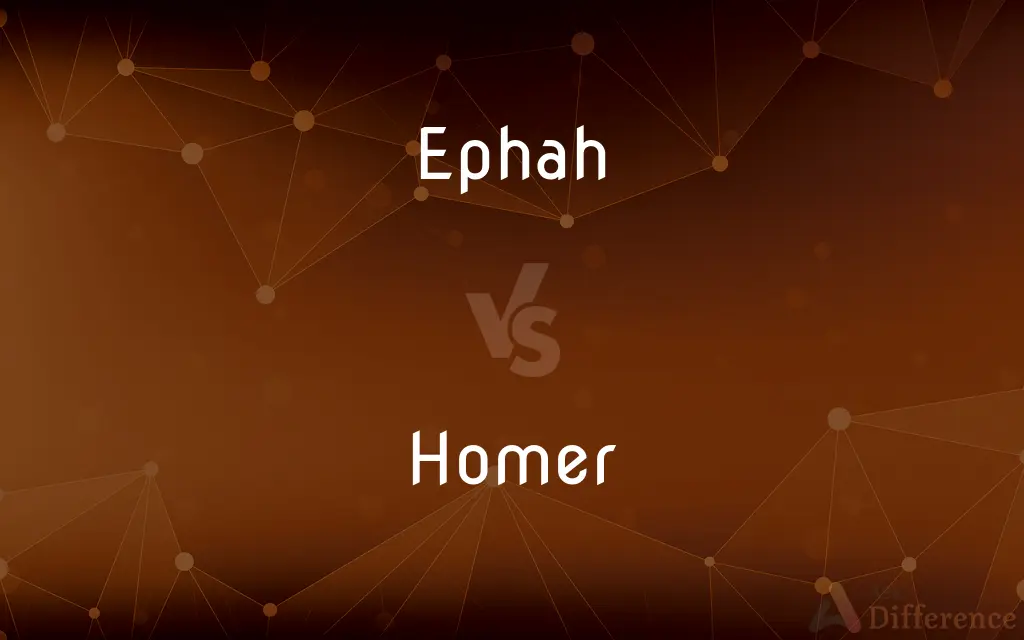Ephah vs. Homer — What's the Difference?
By Tayyaba Rehman & Urooj Arif — Updated on March 28, 2024
An ephah is a biblical unit of dry volume used primarily for grains, roughly equivalent to 22 liters, while a homer is a larger biblical measure, about 10 times an ephah, or 220 liters.

Difference Between Ephah and Homer
Table of Contents
ADVERTISEMENT
Key Differences
An ephah, mentioned in the context of ancient Hebrew measurements, served as a standard unit of dry volume, particularly for grains such as barley and wheat. It is often used in the Bible to describe quantities of grain for offerings or trade. On the other hand, a homer was a much larger unit of measure, also used for dry goods, and was considered equivalent to ten ephahs. This distinction illustrates the scale of trade and agricultural yields in biblical times, with homers used for larger transactions or assessments of harvests.
The ephah, due to its smaller size, was more relevant for daily transactions and offerings. It was a practical measure for individuals and families dealing with everyday provisions and religious observances. Whereas, the homer represented a substantial quantity, suitable for commercial transactions, large-scale agricultural assessments, and state or temple supplies, reflecting the economy and societal organization of the time.
In terms of biblical significance, offerings and tithes often specified quantities in ephahs, underlining its role in religious practices. This contrasts with the homer, which is referenced in contexts that involve larger societal or communal provisions, highlighting different aspects of ancient Hebrew life and spirituality.
Culturally, the use of the ephah and the homer reflects the agrarian society of ancient Israel, where grain was a fundamental economic and sustenance resource. The specific mention of these units in various narratives and laws within the Bible provides insight into the agricultural, economic, and religious practices of the time.
Both units, while serving different scales of measurement, underline the importance of agriculture and trade in ancient Hebrew society. Their use in the Bible and other historical records helps modern readers understand the economic and cultural contexts of the narratives and laws, shedding light on ancient practices and societal organization.
ADVERTISEMENT
Comparison Chart
Volume
Approximately 22 liters
Approximately 220 liters
Biblical Use
Daily transactions, offerings
Large transactions, agricultural assessments
Unit Equivalence
1/10 of a homer
10 ephahs
Cultural Significance
Reflects everyday life and religious observance
Indicates commercial and communal scale activities
Historical Context
Common measure for grains in ancient Hebrew society
Used for large-scale trade and state provisions
Compare with Definitions
Ephah
Ancient Hebrew unit of volume for dry goods.
He offered an ephah of barley as a sacrifice.
Homer
Larger biblical unit for dry volume.
The harvest yielded thirty homers of wheat.
Ephah
Reflects daily sustenance needs.
Each family was allotted an ephah of grain per month.
Homer
Equivalent to ten ephahs.
A tax of one homer was imposed on the farmers.
Ephah
Measure for grains in biblical times.
She gathered three ephahs of wheat from the field.
Homer
Reflects the economic scale of ancient society.
The city's grain reserve held over a thousand homers.
Ephah
Used in offerings and tithes.
A tenth of an ephah was used for the daily offering.
Homer
Indicates large-scale agricultural transactions.
They traded five homers of barley for oil.
Ephah
Represents smaller transactions.
He bought two ephahs of olives at the market.
Homer
Used for commercial and state provisions.
The temple stored hundreds of homers of grain for the festival.
Ephah
Ephah (, Hebrew: עֵיפָה ‘Êp̄āh, Septuagint Γαιφα, Gaipha) was one of Midian's five sons as listed in the Hebrew Bible. Midian, a son of Abraham, was the father of Ephah, Epher, Enoch, Abida, and Eldaah by his wife Keturah (Genesis 25:4 ; 1 Chronicles 1:33).
Homer
Homer (; Ancient Greek: Ὅμηρος [hómɛːros], Hómēros) was the author of the Iliad and the Odyssey, the two epic poems that are the foundational works of ancient Greek literature. The Iliad is set during the Trojan War, the ten-year siege of the city of Troy by a coalition of Mycenaean Greek kingdoms.
Ephah
An ancient Hebrew unit of dry measure, equal to a tenth of a homer or about one bushel (35 liters).
Homer
(Baseball)A home run.
Ephah
A former Hebrew unit of dry volume (about 23{{nbsp}}L).
Homer
A homing pigeon.
Ephah
A Hebrew dry measure, supposed to be equal to two pecks and five quarts. Ten ephahs make one homer.
Homer
A unit of capacity used by the ancient Hebrews, equal to 10 ephahs (about 10 bushels) or 10 baths (about 100 gallons).Also called kor.
Ephah
An ancient Hebrew unit of dry measure equal to about a bushel
Homer
To hit a home run:homered in the fifth inning.
Homer
A former Hebrew unit of dry volume, about equal to 230{{nbsp}}L or 2{{nbsp}}US{{nbsp}}bushels.
Homer
Syn of cor: approximately the same volume as a liquid measure.
Homer
A home run
The first baseman hit a homer to lead off the ninth.
Homer
(US) A homing pigeon.
Each of the pigeon fanciers released a homer at the same time.
Homer
A person who is extremely devoted to a favorite team.
Joe is such a homer that he would never boo the Hometown Hobos, even if they are in last place in the league.
Homer
A homing beacon.
Homer
To hit a homer; to hit a home run.
The Sultan of Swat homered 714 times.
Homer
A carrier pigeon remarkable for its ability to return home from a distance.
Homer
See Hoemother.
Homer
A Hebrew measure containing, as a liquid measure, ten baths, equivalent to fifty-five gallons, two quarts, one pint; and, as a dry measure, ten ephahs, equivalent to six bushels, two pecks, four quarts.
Homer
Same as Home run.
Homer
A base hit on which the batter scores a run
Homer
Ancient Greek epic poet who is believed to have written the Iliad and the Odyssey (circa 850 BC)
Homer
An ancient Hebrew unit of capacity equal to 10 baths or 10 ephahs
Homer
United States painter best known for his seascapes (1836-1910)
Homer
Pigeon trained to return home
Homer
Hit a home run
Common Curiosities
How do ephahs and homers relate to each other?
One homer is equivalent to ten ephahs, indicating a relationship of scale between these two units of measure.
What is a homer?
A homer is a larger biblical unit of dry volume, equivalent to ten ephahs or about 220 liters, used for larger quantities of dry goods.
How did the use of ephahs and homers affect ancient trade?
These units facilitated trade by providing standardized measures for transactions, essential for a thriving agricultural economy.
Why were ephahs and homers important in biblical times?
Ephahs and homers were crucial for agricultural, economic, and religious activities in ancient Hebrew society, reflecting different scales of trade, offerings, and provisions.
What is an ephah?
An ephah is a unit of dry volume from ancient Hebrew times, primarily used for measuring grains, equivalent to about 22 liters.
Can you convert ephahs to modern measurements?
Yes, an ephah can be approximately converted to 22 liters, making it a tangible measure for understanding biblical quantities in today's terms.
Are there any modern equivalents to ephahs and homers?
Modern measurements such as liters or bushels can serve as equivalents, with one ephah roughly translating to 22 liters.
How do archaeologists know the sizes of ephahs and homers?
Archaeological findings, including inscribed standards and containers, alongside historical texts, help researchers estimate the sizes of these units.
Were ephahs and homers used outside of Israel?
While ephahs and homers are primarily mentioned in the context of ancient Israel, similar units of measure were used throughout the ancient Near East.
Did the value of an ephah or homer vary over time?
While the biblical text provides specific ratios, the exact volume could have varied based on regional standards or over time.
How were ephahs and homers measured in ancient times?
Ancient societies used vessels and containers standardized to these measures for transactions and offerings.
Is there a spiritual significance to ephahs and homers?
In biblical literature, these measures often appear in contexts that underline principles of fairness, provision, and obedience to divine laws.
Could ephahs and homers be used for liquids?
Primarily used for dry goods, the biblical text focuses on grains; however, liquids were measured in different units such as the bath or hin.
Why are ephahs and homers mentioned in the Bible?
They are mentioned to provide specific details on quantities related to agriculture, trade, and religious practices, offering insights into the societal and economic structures of the time.
What lessons can be learned from the use of ephahs and homers?
The use of these measures highlights the importance of standardized units in facilitating economic activity and societal organization.
Share Your Discovery

Previous Comparison
Vacation vs. Vacancy
Next Comparison
Idol vs. SuperstarAuthor Spotlight
Written by
Tayyaba RehmanTayyaba Rehman is a distinguished writer, currently serving as a primary contributor to askdifference.com. As a researcher in semantics and etymology, Tayyaba's passion for the complexity of languages and their distinctions has found a perfect home on the platform. Tayyaba delves into the intricacies of language, distinguishing between commonly confused words and phrases, thereby providing clarity for readers worldwide.
Co-written by
Urooj ArifUrooj is a skilled content writer at Ask Difference, known for her exceptional ability to simplify complex topics into engaging and informative content. With a passion for research and a flair for clear, concise writing, she consistently delivers articles that resonate with our diverse audience.















































